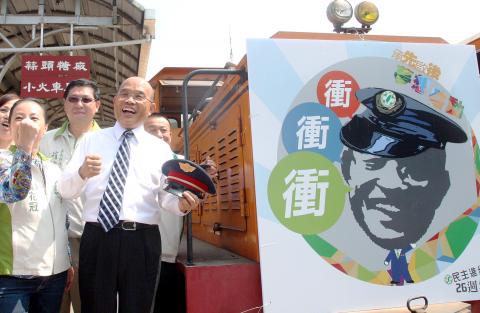Developing a strong economy for sustainable livelihoods is the unavoidable responsibility of a national leader and President Ma Ying-jeou (馬英九) should put his money where his mouth is, Democratic Progressive Party (DPP) Chairman Su Tseng-chang (蘇貞昌) and former DPP chairperson Tsai Ing-wen (蔡英文) said yesterday in response to Ma’s National Day speech.
“The biggest wish of Taiwanese on National Day is to enjoy a better standard of living, rather than watching a president talking,” Su said in Lioujiao Township (六腳), Chiayi County.
“Instead of boasting about tomorrow, I would advise the president visit local communities and gain first-hand experience of people’s suffering,” said Su, who turned down an invitation from the Presidential Office to attend the National Day ceremony.

Photo: CNA
The Ma administration has failed to listen to the people’s voice, evidenced by the president’s recent “inflammatory remark” that laziness was why people do not exercise as often as they should.
Tsai, who also skipped the ceremony and visited Nantou County, told reporters the economy is key for Taiwan and that people expect a competent and responsible government to help the country emerge from the economic slump.
Asked to comment on Ma’s speech, Tsai said his pledges were empty and sounded “more like a first-year president than a fifth-year president” because Ma “keeps telling people what he plans to do, rather than what he has achieved.”
The former DPP presidential candidate also offered advice to Ma on her Facebook page.
Quoting former US president Andrew Jackson, who said the greatness of an administration is built upon freedom, abundance and the fearlessness of its people, Tsai said a government which lacks the determination to safeguard freedoms and cannot take care of people’s everyday lives is not qualified to demand the loyalty of its people.
The worsening economic situation, including rising prices, an growing unemployment rate, furloughs and stagnant wages, has affected everyone — young and old — nationwide, Tsai said.
“The government appears to be the culprit of the people’s suffering,” she wrote.
The Ma administration has turned a deaf ear to warnings about the economy from the DPP and academics, Tsai said, adding that Taiwan’s overdependence on the Chinese market and the failure of industries to upgrade had hurt the nation’s global competitiveness.
Ma’s decision to raise electricity and fuel prices was like adding fuel to the fire, as the poor get poorer and the middle-class is struggling like never before, she said.
Tsai said she had expressed hope that Ma would “listen to the voice of the people, and take care of each and every Taiwanese” in her concession speech on the night of the presidential election on Jan. 14, but it is obvious that Ma had not been listening.
“I want to remind you [Ma] again, on National Day, that people are not required to lend unconditional support to the country unless their freedoms and well-being are amply protected,” Tsai said.

SECURITY: As China is ‘reshaping’ Hong Kong’s population, Taiwan must raise the eligibility threshold for applications from Hong Kongers, Chiu Chui-cheng said When Hong Kong and Macau citizens apply for residency in Taiwan, it would be under a new category that includes a “national security observation period,” Mainland Affairs Council (MAC) Minister Chiu Chui-cheng (邱垂正) said yesterday. President William Lai (賴清德) on March 13 announced 17 strategies to counter China’s aggression toward Taiwan, including incorporating national security considerations into the review process for residency applications from Hong Kong and Macau citizens. The situation in Hong Kong is constantly changing, Chiu said to media yesterday on the sidelines of the Taipei Technology Run hosted by the Taipei Neihu Technology Park Development Association. With

CARROT AND STICK: While unrelenting in its military threats, China attracted nearly 40,000 Taiwanese to over 400 business events last year Nearly 40,000 Taiwanese last year joined industry events in China, such as conferences and trade fairs, supported by the Chinese government, a study showed yesterday, as Beijing ramps up a charm offensive toward Taipei alongside military pressure. China has long taken a carrot-and-stick approach to Taiwan, threatening it with the prospect of military action while reaching out to those it believes are amenable to Beijing’s point of view. Taiwanese security officials are wary of what they see as Beijing’s influence campaigns to sway public opinion after Taipei and Beijing gradually resumed travel links halted by the COVID-19 pandemic, but the scale of

A US Marine Corps regiment equipped with Naval Strike Missiles (NSM) is set to participate in the upcoming Balikatan 25 exercise in the Luzon Strait, marking the system’s first-ever deployment in the Philippines. US and Philippine officials have separately confirmed that the Navy Marine Expeditionary Ship Interdiction System (NMESIS) — the mobile launch platform for the Naval Strike Missile — would take part in the joint exercise. The missiles are being deployed to “a strategic first island chain chokepoint” in the waters between Taiwan proper and the Philippines, US-based Naval News reported. “The Luzon Strait and Bashi Channel represent a critical access

Pope Francis is be laid to rest on Saturday after lying in state for three days in St Peter’s Basilica, where the faithful are expected to flock to pay their respects to history’s first Latin American pontiff. The cardinals met yesterday in the Vatican’s synod hall to chart the next steps before a conclave begins to choose Francis’ successor, as condolences poured in from around the world. According to current norms, the conclave must begin between May 5 and 10. The cardinals set the funeral for Saturday at 10am in St Peter’s Square, to be celebrated by the dean of the College